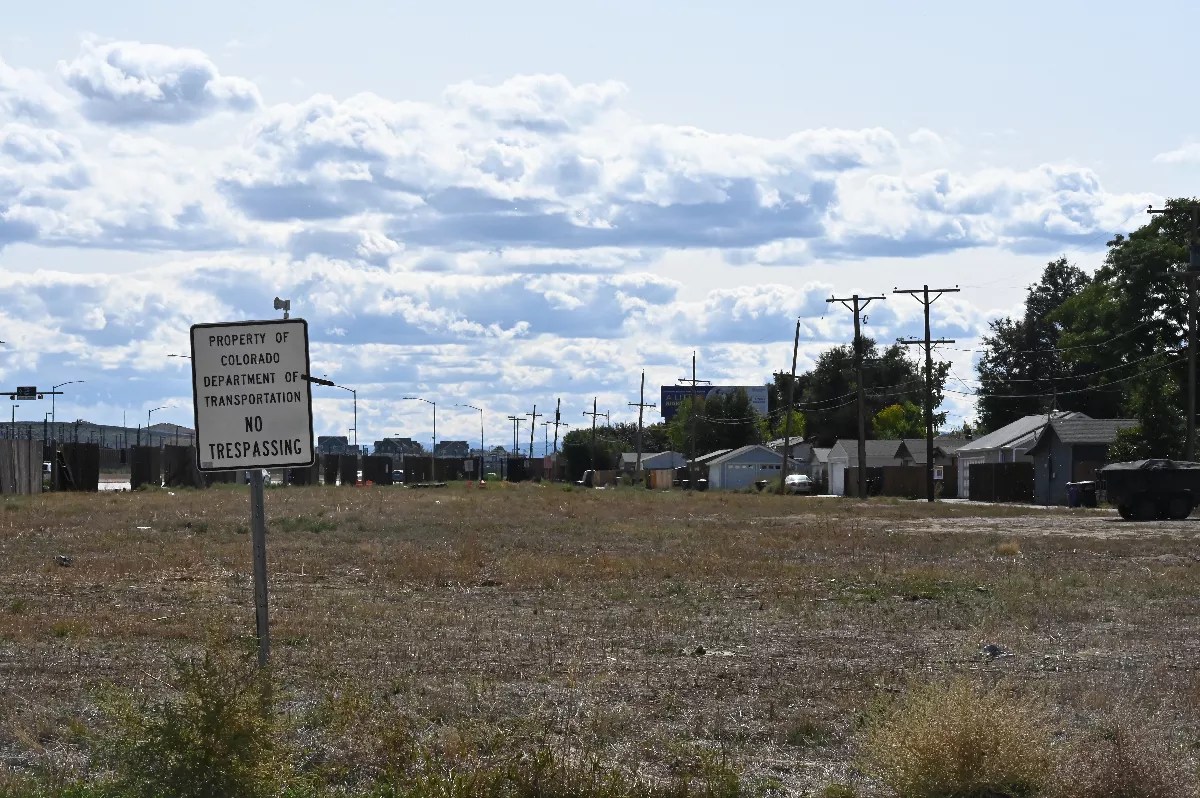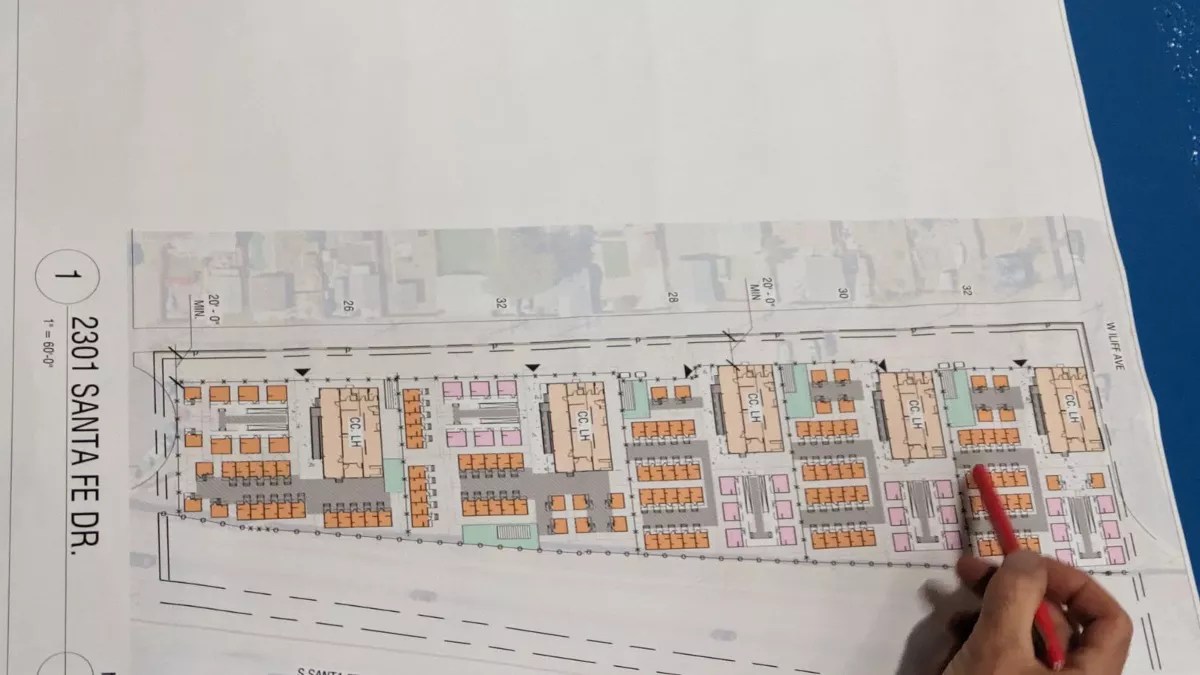
Bennito L. Kelty

Audio By Carbonatix
Yet another Denver neighborhood is opposing a micro-community planned for its area.
This time it’s Overland – where more than 300 homeless individuals are slated to move into a micro-community at 2301 Santa Fe Drive, which will be sandwiched between homes and the freeway.
Residents say they’re terrified over the prospect of having such a large collection of homeless people move in at once.
The micro-community will host 155 units, with availability for up to two people each, according to Denver city records.
Private facilities such as these – which utilize tiny homes and pallet shelters – are central to Mayor Mike Johnston’s House1000 plan to get 1,000 residents off the streets and into housing by the end of the year. Johnston expects to start moving individuals into planned micro-communities in the coming weeks.
The mayor has gotten slapped with repeated criticism in recent weeks by people who feel his House1000 plan is being carried out with little consideration for the public. Residents in the Golden Triangle have already aired their grievances – both to Johnston’s face and behind closed doors – while others in the Holly Hills area have called for the formation of a registered neighborhood organization to oppose a micro-community planned for 5500 East Yale Avenue.
Concerns about the size of the micro-community and how the other sites are being spread across the city have been at the top of the complaint list for most of the homeowners that Helene Orr represents as president of the Neighbors of Overland North (an RNO), she says.
“This particular site is huge,” Orr tells Westword. “It’s a big problem, it’s a tough issue, and for it to be successful, there has to be some neighborhood buy-in, and [Johnston] is really getting off on a bad foot.”
Although Orr only represents the Overland neighborhood north of Evans Avenue, she says homeowners who live to the south have also voted to oppose the micro-community going up. “It’s pretty fair to say that the majority of people [in the neighborhood] are not in favor of it as it stands now,” Orr says.
“It seems like a big burden for us to take on,” adds Heather Barnes, an Overland resident. “Why place that burden here of that scale when we already have another one in District 7?”
Right now, District 7 is slated to host a site at 950 West Alameda Avenue.
Mayor Johnston has claimed that each city council district would host a micro-community, but none have been publicly announced for Districts 1, 2 or 5.
In a letter to the mayor last week, Orr pointed out how the distribution of sites is “not equitable by any stretch” because there are no micro-community sites planned so far for “the very wealthy neighborhoods of Denver: Cherry Creek, Country Club, Belcaro, Bonnie Brae, Wash Park, Platt Park.”
Orr added, “If you want neighborhoods to accept and support these sites, we need to see that no neighborhoods are exempt from participating in the solution. Until then, expect to be met with resistance.”
City officials have not said what the capacity of the other micro-community sites will be. A spokesperson for the Department of Housing Stability tells Westword that the city is still holding a “community information meeting” for each proposed micro-community “prior to any occupation of the site.” The feedback and other assessments will “help inform how many units each site can accommodate,” the rep says.
A community information meeting about the Overland site was held on Thursday, September 28. That was when Barnes and other neighbors found out about the size of the incoming micro-community and that “there was overwhelming concern,” she says.
Orr recalls how the mayor and his staff “were not well received” on account of all the frustrations felt by neighbors.
“I understand it’s a tough and sensitive issue all around,” she says. “We do want to help as a community, but we, like other communities that they want to bring this to, are concerned. We have some fears, and I’m not sure that those were really addressed to the level that we would like to see.”

Residents of Overland were shocked to find out last week that their neighborhood would have to host as many as 300 homeless people at a micro-community site.
Courtesy of Heather Barnes
Orr says that Johnston “was long on assurances, short on details” at the meeting – “a bit of the usual,” she blasts.
She was also surprised that the city went from saying it would house fifty to a hundred people at each site and then “we went to this meeting, and all of a sudden, we look at the map and it’s 155 [units].”
Johnston’s team rolled out a “pretty general PowerPoint presentation” that “mostly answered what a micro-community is” but didn’t go into more detail about the specifics, Barnes says. The 300-plus capacity of the Overland micro-community is “a little concerning,” she tells Westword, noting how the meeting with Johnston “didn’t really help” things.
“There was some frustration, because we felt like that was information we already knew and not a lot of new information coming out,” Barnes remembers. “We’re nervous that we would kind of be potentially the first to have something of this scale.”
Over the past few months, the mayor has been trying to reassure the public that micro-communities are safe. “That’s kind of the main concern,” Barnes says. “There was very little detail about any kind of vetting” of individuals at the micro-community. “Like the Golden Triangle, the low barrier is a concern; there are no background checks that are going to be done on the [micro-community] residents. If they are coming to our neighborhood and they are going to be close to neighbors and in the community, those things are a little worrying to us.”
At the September 28 meeting, Johnston told Overland residents that “the current system in the city is not working” to keep people safe, and that micro-communities would have rules to keep residents in check. “They have a chance to be in housing locations that have high degrees of accountability, have high degrees of security and supervision and have rules,” Johnston said. “You have to comply by those rules, or you can get removed or you can get arrested.”
When defending micro-communities, Johnston often cites data showing that they are “literally one one-thousandth of the safety risk to the community of what the current situation is” – as he did during a September 12 press conference.
Overland is an official neighborhood in District 7 and has multiple RNOs. It’s represented by Councilwoman Flor Alvidrez, whom Barnes credits for being “very willing to meet with neighbors and try to represent our voices.” But she also admits that Alvidrez hasn’t been able to provide many details about when the micro-community will open and why their neighborhood was selected to host it.
Alvidrez did not respond to requests for comments this week. Barnes says that she and other neighbors met with the councilwoman on Tuesday, October 3.
The property where the Overland micro-community will be placed is owned by the Colorado Department of Transportation. A CDOT spokesperson tells Westword that they have no information on how much the city is paying to use the land, why their property was chosen, or when it will open as a micro-community.
Like residents from the Holly Hills area and the Golden Triangle, neighbors in Overland are upset that Johnston didn’t inform them about his plans ahead of time. “There were a lot of people who were finding out as it was happening,” Barnes says. “We wish the communication there would have been a little bit better and more encompassing of the entire neighborhood.”
While Barnes and Orr both like and appreciate that the mayor is trying to solve the homelessness issue in the city, Orr says they feel like “we’ve not been told the truth entirely” by Johnston.
“Now we’re forced, in a way, to be in this opposing mode, which isn’t necessarily where we want to be,” Orr says. “I’m not sure this is a very well-thought-out plan.”
Barnes concludes, “At the end of the day, I think people want this to be a good thing for the communities and for Denver. It’s just the concerns, I don’t think they’ve been addressed sufficiently.”